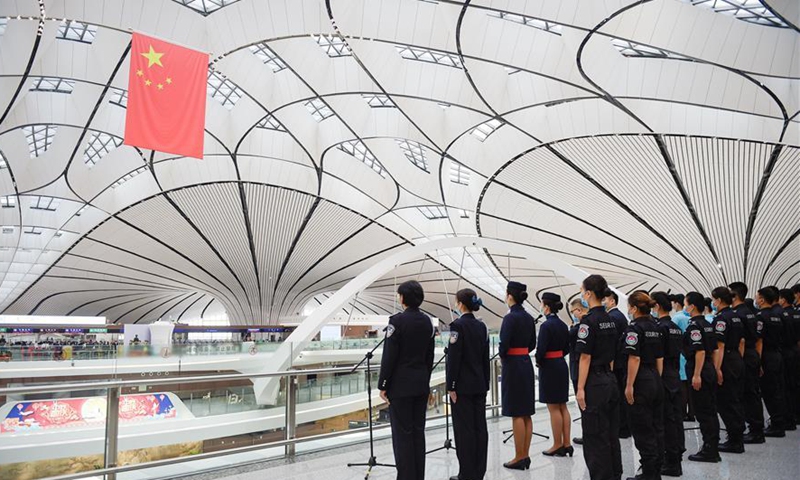By Wang Zhou, People’s Daily
In the past five years since Beijing Daxing International Airport was put into operation, it has achieved a series of remarkable milestones. The airport has remained a three-peat winner of the “China Civil Airport Service Quality Excellence Award” since 2021. Besides, it has served over 127 million passengers and handled 860,000 tons of cargos.
Since its grand opening on Sept. 25, 2019, Beijing Daxing International Airport has rapidly established itself as a major global hub, boasting an impressive array of achievements underpinned by cutting-edge operations.
Its terminals offer seamless WiFi connectivity, while its mobile application allows passengers to track their luggage in real-time. Airlines based at the airport share flight information to enable smart climate control in baggage areas, automatically adjusting air conditioning based on passenger presence.
Recently, it’s been surprisingly found by international travelers that they can complete tax refund and border inspection procedures with only an electronic boarding pass. “Now, after finishing the formalities, there is extra time for me to wander around the airport, which is more convenient,” one passenger said.
Since its inauguration in 2019, Beijing Daxing International Airport has introduced a streamlined service that allows passengers taking domestic flights to complete check-in, security screening, and boarding using only their identity document and facial recognition. In July this year, the airport extended this service to selected international flights.
“While printing a paper boarding pass might seem quick, it still requires passengers to visit check-in counters and wait in line,” said Wang Guijia, an assistant in the airport’s terminal management department. She noted that this service upgrade saves passengers an average of 15 to 30 minutes.
For passengers, airport efficiency directly impacts their travel experience. For airlines, every second of aircraft operation is tied to real money.
According to Zhang Yansuo, energy and environment business manager of the international technology department at Beijing Daxing International Airport, the airport launched a pilot program last year which aims at strengthening coordination with air traffic control authorities to enable more arriving and departing flights to “fly straight” without detours.
Currently, the airport sees an average of over 40 flights per day using these shortcuts, saving an average of 131 minutes in ground taxiing time daily. This is expected to reduce annual fuel consumption by nearly 1,200 tons.
As China gradually expands its visa-free transit policy to include more countries and continues to implement measures facilitating travel for foreign visitors, Beijing Daxing International Airport has seen a significant increase in international passenger traffic. As of Sept. 18, 3.27 million entries and exits have been recorded by the airport since this year.
Airports are windows to the outside world for a country or region, serving as crucial nodes in the global industrial system. They show the convenience of transportation, and also act as engines of development.
Leveraging the international and domestic transport capabilities of Beijing Daxing International Airport, the Daxing area of the Beijing Daxing International Airport Economic Zone has established an industrial development system led by the life science and healthcare industry, built on high-end services and aviation support, and with a focus on next-generation information technology and smart equipment.
The area has seen the completion of a series of major projects, including an international biopharmaceutical park, with a total fixed asset investment of 77.3 billion yuan($11.02 billion). It is home to 199 foreign-invested enterprises.
KRS Group is a precision manufacturing company specializing in the research, production, and sales of Class III dental implants and biomaterials. Having recently settled in the Comprehensive Bonded Zone of Beijing Daxing International Airport, the company has already received numerous orders.
General manager Su Hanqi of the company said, “The airport economic zone not only facilitates the rapid flow of innovation factors like talent and technology, but also offers a number of preferential policies. Establishing ourselves in the Comprehensive Bonded Zone allows us to enjoy tax exemptions on imported machinery and raw materials, significantly reducing our operational costs.”
He Xiaomeng, head of Langfang Chengrong Technology Co., Ltd., has keen insights into the reforms at the airport economic zone. In the past, when declaring bonded goods for export under a single customs declaration, multiple trucks were needed if the volume of goods was large. With the introduction of a “one ticket, multiple trucks” policy in the Comprehensive Bonded Zone, the company only needs one truck nowadays to complete the export of the bonded goods under one ticket, saving around 50 percent of the transportation costs.












